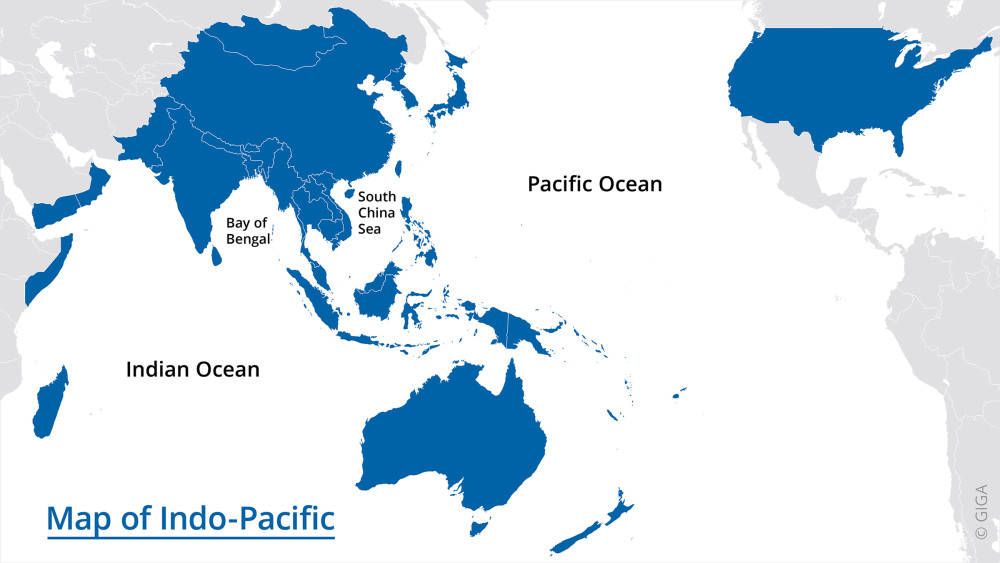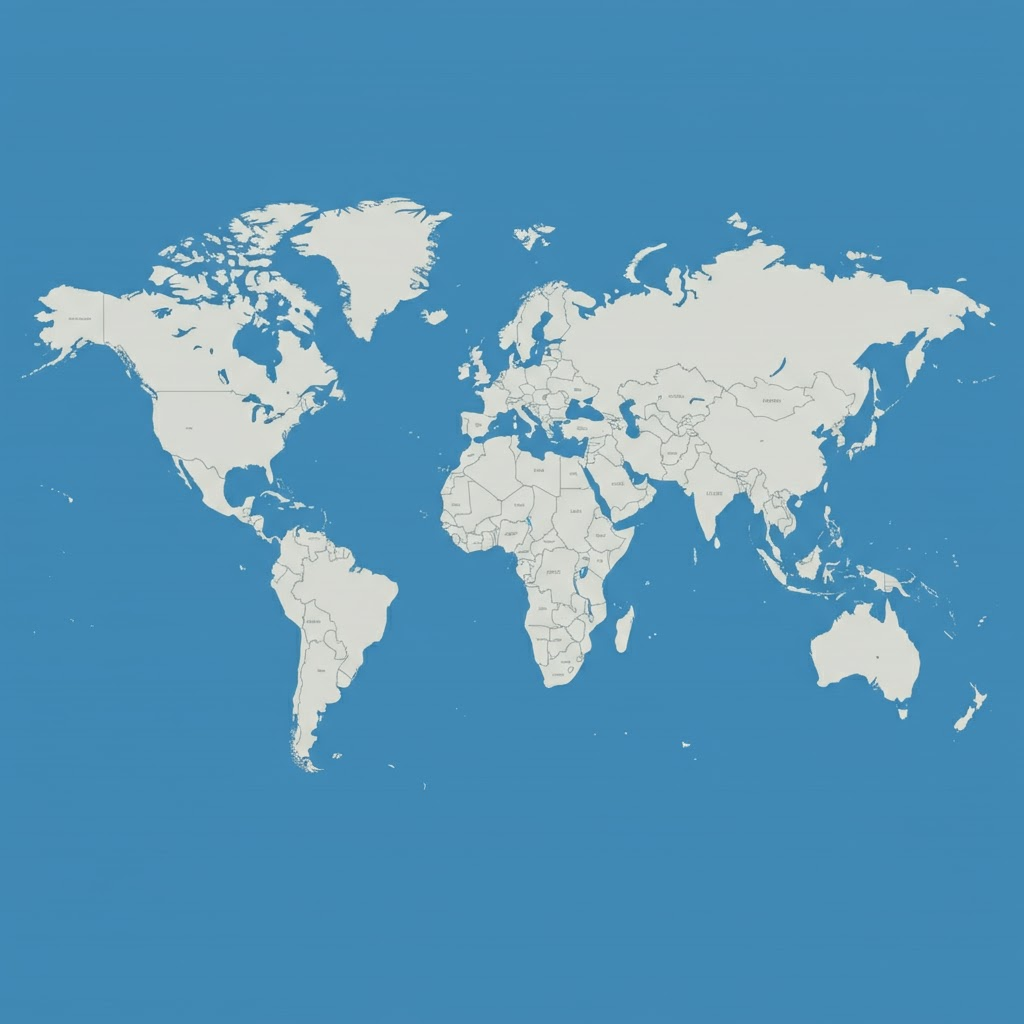What is the Indo-Pacific
The Indo-Pacific concept is a recent result of the new political and economic order. It’s an unclear concept with many definitions, specific to each power. The rise in power of China and the exponential rise of international exchanges by sea quickly made the Indo-Pacific one of the most important zones in the world, on the economic and geopolitical scale. Indeed, in its most minimalist definition, the Indo-Pacific includes more than a dozen countries (17) and around one third of the world population. It’s a square going from India to Japan, to Papua-New guinea and to southern Australia.
Though, the most common definition is the one considered maximalist. It goes from the Ormuz and Bab-Al-Mandab straits to the northern part of Japan and China and including all the “Pacific islands”. The West coast of the United States is usually included by many nations, considering the importance of the USA in the region.
Nowadays, almost all the powers are seeking to anchor their interests in the region. Back in 2021, the EU released a “plan of cooperation in the Indo-Pacific” with a will of including China. This will is not shared among all other nations. In addition, local nations (6 members of the G20 out of 20) like France or the UK establish their interests by signing treaties or by possessing overseas territories. There are several stakes in the Indo-Pacific. They include economic, political, strategic, ideological and military aspects. The question is: why is the Indo-Pacific one of the most important areas in the world ?

Map of Indo-Pacific; Crédits: Sciences Po.fr
Political and ideological stakes
During 2024, many elections took place around the world. Some of these elections took place within the Indo-Pacific, with different impacts on the rest of the world. In Bangladesh, legislatives elections saw the departing Prime minister getting re-elected on January 7th of 2024. In Indonesia, the 14th of February, former defence minister and retired general Prabowo Subianto was elected with 58,6% of the votes.
Taiwan held legislatives elections in January with more stakes on the international scale. It saw former vice-president Lai-Ching Te being elected, during a context of military pressure by China. As a new president, his focuse is on an occidental friendly international policy. The result of the election prevents Beijing from exercising more influence on the archipelago. In India, Prime Minister Narendra Modi, leader of the nationalist BJP party, was re-elected for a second term. Modi believes in a policy that includes every nation, while countering China’s rise. We need to remember that Beijing is a rival of New Delhi in the race to power.
The most important election of the year 2024 took place in the beginning of November. It was the race for the White House between Vice-president Kamala Harris and Donald Trump. The former president won, and we could expect many changes on the international policy that the Republican will run from January 2025. What consequences will it have on the relations with China and the Taiwanese situation for instance. We cannot really know yet.
Indeed, the Indo-Pacific is the theatre of the current geopolitical order. All nations have their own vision of what the Indo-Pacific should be, the EU considesr that China should be included, while the USA or Japan want to counter the rise of China. The only goal shared by all nations is that the Indo-Pacific should be kept stable and prosperous.
However, Beijing does not recognize the concept of the Indo-Pacific. Indeed, China feels threatened by other powers and qualify the Indo-Pacific as a “containment” measure against them.
Economical stakes
The Indo-Pacific holds the most important straits of the world.
The eastern part of the Indo-Pacific, the Hormuz strait, connecting the Gulf Sea and the Indian ocean, conveys 30% of the world oil. 20 million barrels a day, with 70% go to Asia. The strait of Bab-al Mandab, connecting the Mediterranean Sea and the Indian Ocean by the Suez Canal and the Red Sea conveys 20,000 vessels annually and around 3,6 million barrels of oil each day.
Then, the Malacca strait is among the most important in the world. It conveys 30% of the world trade. Connecting Africa and the Middle East with the rest of Asia, it lies between Sumatra and the Malay Peninsula. The strait is vital for China as huge majority of their GDP comes from the sea trading (71%). Moreover, other local nations share this vital need of using the strait.
The Indo-Pacific holds 14 of the 20 biggest trade harbours in the world. This illustrates the importance for global trade.
In fact, many resources located in the Indo-Pacific are yet to be exploited. Indeed, it is estimated by the Energy Information Administration, that there are more than 200 million barrels of oil in the region. Those resources are among the main reason of why nations want to keep a free-access to the Indo-Pacific.
Moreover, the trade in the Indo-Pacific and its strategic location like Malacca strait are vital to nations like China in particular. As said before, Chinese GPD comes at 71% from the sea trading and the exploitation of sea resources (mainly fuels and halieutics). This part of the economy benefits to the Belt & road initiative launched in 2013.
Military, geopolitical and strategical stakes
The Indo-Pacific is subject of many strategic stakes, but also alliances and treaties.
First, in a context of a “Second Cold War” between USA and China, both powers have their own way of making alliances. The USA are member of the QUAD organisation including Japan, Australia and India. Their goal is to form a solid alliance in the region to counter China.
Beijing concludes alliances with the belt & road initiative, by building infrastructures and giving money. Countries like Thailand, Sri Lanka or Malaysia “benefit” from the Chinese project. Indeed, the concerned nations usually have a heavy debt to China because of the price of the infrastructures built.
The context of “Cold war” is anchored by conflict like the Taiwanese situation. Taipei can count on the USA against a Chinese leader who does not hide his ambition of conquering the island.
Moreover, Chinese ambitions do not lay only in Taiwan but go even further away in the sea. Especially, in the South China sea where many nations have their own Economical Exclusive Zone (EEZ). Even though these islands belong to other nations, China revendicates the Nine-Dash line which includes Taiwan, and the zone in the South China.
With this will of expansion showed by China, other nations like Japan and South Korea need the support of the USA. Indeed, the USA has 3 of its 7 fleets located in the Indo-Pacific. Moreover, the North Korean threat is another reason of the tight links between the USA and those nations.
Non-local powers also need to have an influence in the Indo-Pacific. The European Commission published in 2021 the “European strategy in the Indo-Pacific” which aims for a global cooperation in the region, by including China. In fact, the EU holds vital interest in the Indo-Pacific, as China is its first economical partner.
To conclude, the Indo-Pacific has risen from a region of poor countries with seatrading routes, to maybe the most important zone with rising superpowers and many ressources to exploit. This rise began in the 80’s and isn’t slowing down as more vessels travels through the region each year. Adding all the geopolitical stakes, the Indo-Pacific will probably be the home of the new world order.










